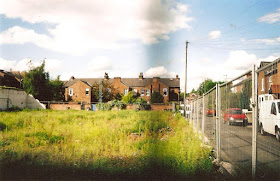They arrived in the township, focused on the popular bits and
sold them on to the postcard companies.
Sometimes on the off chance they prowled the new roads of New Chorlton
and the Ville, taking pictures of individual houses and offering them at a
knock down rate to the residents.
Then there were the serious amateurs like Aaron Booth* who
in the early 1880s was taking photographs of Martledge. But there are also the snappers,
who captured whatever took their fancy.
Often the images are a little blurred and in many cases have a significance
lost in time.
And so with this in mind here is the new series. Snaps of Chorlton, is an occasional rummage through
pictures most of which were never meant to be shared beyond the family. Of
course the advent of the camera phone has given this a new lease of life.
But for now I am concentrating on old fashioned images and I
am starting with two from Ida. The first
was taken by her dad and while the date is unknown it must be before the
development of the precinct, because this is Manchester Road from the corner of
Wilbraham Road. Back then it is still a
tree lined road of big houses which gently curved round past the Savoy Picture
House and around the library. The car
park has yet to break the sweep of the road.
It is a scene I featured recently from a 1938 postcard but
is well worth another look.
Row House dated from the early 19th century and
had quite a history. Here lived the
Blomely’s who gave their name to the fish pond that ran from Acres Road up to
Chequers Road, and also lived William Batty, politician, jeweller and Methodist For a while the house was used as our “Penny
Reading Room”, while the adjoining building had been a laundry and factory.
So its passing which generated a stir at the time is
important as it was one of the last examples of an early 19th
century property in the township. And
here I have a confession, for I have a brick from the house. I asked for it and the demolition gang a
little bemused handed it over. It was handmade,
perhaps with clay from our own clay pits off Oswald Road and I guess was put in
place around about 1800.
And a little later Ida took her picture.
Location; Chorlton, Manchester
Location; Chorlton, Manchester
Pictures; from the collection of Ida Bradshaw


No comments:
Post a Comment